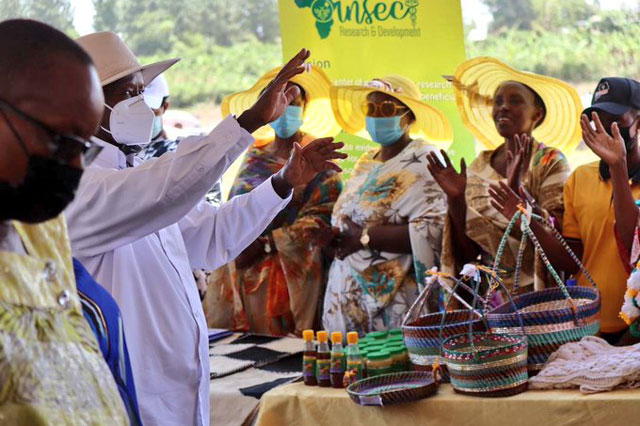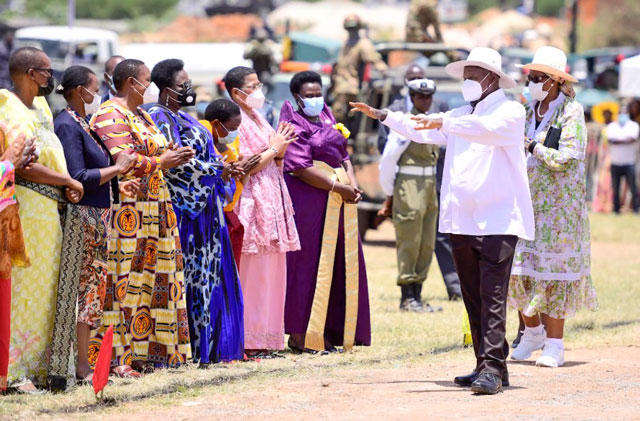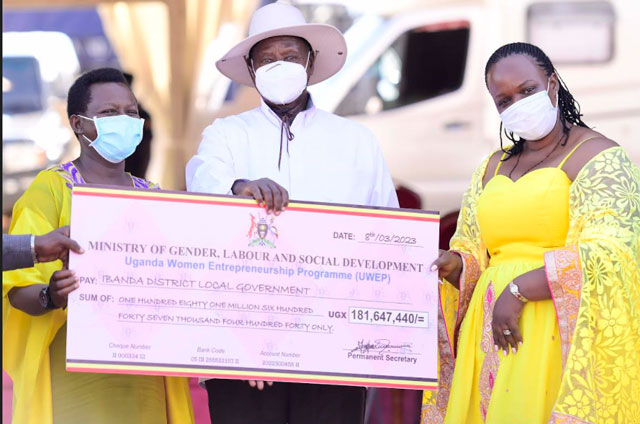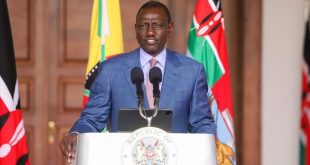
Families getting out of poverty is a good first step to supporting women
Kiruhura, Uganda | President Yoweri Museveni has showcased the development and growth of Kiruhura district as one that the rest of the country can learn from to leapfrog to sufficient household income through commercial agriculture. At the International Women’s Day celebrations at Sanga Playground, Kiruhura District on Wednesday, a short video showcasing the many new houses in the district, was shown to the crowd.
Museveni said in about 30 years, many homes had transformed from mostly grass thatched houses, to mabati and brick houses fully with flowing water and solar power, and families with enough income to send their children to school.
The President said he is happy to be in Kiruhura , for it was there in 1966 that he and fellow student Black Mwesigwa inititated a campaign againt pastoral nomadism.
He however warned that all the progress, in Kiruhura and the rest of the cattle corridor in Uganda, is being reversed but traditional customs of children sharing and splitting the property of their parents when they pass on.
“Therefore, all Ugandans, stop excuses. It is possible to get out of poverty. The people in the cattle corridor had got out of poverty through the dairy industry guided by the NRM,” he said, adding, “They are now sliding back because of the residual cultural backwardness. We are also fighting that. You all can get out of poverty.”
After fighting the successful war against nomadism that started in the 60s, Gen. Museveni asserted that he then embarked on a country-wide tour in 1995 lecturing Ugandans about the four (4) acre-model strategy aimed at fighting poverty and improving household incomes.
“Will wealthier families pay for the girl child to study or not? Show me a daughter or son of a rich family that has dropped out of school on account of not being able to pay the school costs? Families getting out of poverty is a good base, a good first step for solving other problems,” Museveni said.
He said, investment in commercial agriculture and the move away from nomadic pastoralism has boosted Uganda’s production in the dairy sector.
Museveni recalls impact of 1966 campaign
Museveni traced the progress to December 1966, when they (student group) launched an anti-nomadism campaign in Kiruhura and they moved from kraal to kraal educating people, about the dangers of nomadism and the pre-capitalist traditional economy of only working for the stomach (okukorera enda yoonka).
“Many people listened to our message and stopped nomadism, fenced the land they occupied traditionally, dug bigger wells, started spraying against the ticks, stopped bush-burning and engaged in crop farming (especially bananas), in addition to cattle rearing. The calf mortality radically reduced, and their herds multiplied. Between 1966 and 1986, their herds multiplied and had more food security but then, one question remained unanswered. This is the issue of the correct enterprise in terms of maximizing homestead incomes, taking into account the size of the family land,” said President Museveni who was accompanied by the First Lady, Janet Museveni.



President Museveni also explained that when the families get out of poverty through commercial farming, manufacturing, services, ICT ─ the four sectors ─ it is easier to address all the other marginalized groups including the women.
“What have been the results? Big transformation. Milk produced in Uganda has gone from 200 million litres per year to now 3.22billion per year and Uganda’s processing companies have increased from just 01 company (DCL) with a processing capacity of 60,000 litres per day in 1986, to currently 145 companies with a processing capacity of 2.89 million litres per day. These are employing mainly women and youth,” he boasted.
The President further disclosed that Uganda’s dairy sector is now valued at US$3.8billion, the export portion of which brings in US$106.2million per year.
“We are aiming at 20 billion litres. You will not get out of poverty through ranching but you could get out of poverty through dairy farming,” President Museveni said, adding, “I am, therefore, very happy that you, the women of Uganda, are here to witness this transformation I have been telling you about. The whole of the cattle corridor has got this message and have embraced it. Parts of the districts involved are found in Isingiro, Kashaari, Kiruhura, Kazo, parts of Ibaanda, Lyantonde, parts of Rakai, Ssembabule, Kyegyegwa, parts of Gomba, parts of Mubende, Kiboga, Kyenkwaanzi, Nakaseke and Nakasongola.”
At the same event, the President awarded 63 people with medals for their distinguished roles in the political and socio-economic transformation of Uganda. He also handed over 1, 481 land titles to the residents of Kiruhura to confirm their land ownership.
President Museveni also signed cheques and gave out support fund to women groups under the Uganda Women Entrepreneurship Programme (UWEP). The districts which benefited include Kamwenge, Kasese, Kiruhura, Lwengo, Ibanda, Kazo, Bushenyi and Mbarara.
Education is key, says Minister Amongi
The Minister of Gender, Labour and Social Development, Betty Amongi said this year’s theme focuses on how Uganda should address the gender gap in science and technology.
“This starts with a call for education especially for the girl child. Education is the foundation of science and technology. Without a base in Education, we cannot achieve that goal,” Amongi said.
“Government has come up with several programs to empower women. I think we are making progress, Your Excellency.”
France’s Ambassador to Uganda, Xavier Sticker lauded Uganda under the able leadership of President Museveni for its strong political will to put women on the equal line with men.
“Uganda has a progressive legal framework that promotes gender equality. You have lived up to empowering and supporting women capacity with equal rights,” Ambassador Sticker said.
Rose Mungai, a Senior Economist at the World Bank assured President Museveni of the institution’s commitment to support women’s needs and gender equality in Uganda.
To unlock the potential of women entrepreneurs in Uganda, Mungai revealed that through the Growth Opportunities and Productivity for Women Enterprises (GROW) Project, World Bank has already set aside over Shs800bn to support a multi-sectoral program of customized services that empower women entrepreneurs and transition their enterprises, from micro to small and, from small to medium, as well as improve their productivity.
The Kiruhura Woman MP, Jovanice Rwenduru said women in Uganda are currently celebrating their achievements because of the good leadership of the National Resistance Movement (NRM) Government that has been empowering them since coming to power in 1986.
“Your Excellency, we are so proud to note that women today are capable of doing very many things because of you. We are in politics, health, Education and everywhere,” the legislator noted.
Hajjat Faridah Kibowa, who represented the National Women leaders commended President Museveni for being a champion in empowering women in Uganda. She said the President has played an exceptional role towards promoting gender equality through programs such as affirmative action.
 The Independent Uganda: You get the Truth we Pay the Price
The Independent Uganda: You get the Truth we Pay the Price


